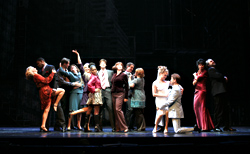According to legend, the 1970 debut of Stephen Sondheim’s Company forever changed the American musical. After a pair of flops (Anyone Can Whistle in ’64 and Do I Hear a Waltz? in ’65), Sondheim had approached director Harold Prince with an unusual and challenging idea: turn a series of one-act plays about contemporary marriage, written by actor and Sondheim friend George Furth, into a full-blown musical. This was not the typical stuff of a song-and-dance revue. Sondheim, unable to find a suitable form for the script, decided to take what he described as a Brechtian approach—doing away with plot, relying instead on a succession of vignettes revolving around a bachelor celebrating his 35th birthday. Moving liberally back and forth through time, each episode finds the bachelor, unable himself to make up his mind about the big commitment, hanging out mostly with married couples he knows. That’s the story, and that’s the show.
Company—now playing at the 5th Avenue under the direction of David Armstrong, who scored a bloody fun hit last year with his strong, rousing production of Sondheim’s Sweeney Todd—doesn’t carry the same power to startle and titillate that it did at its premiere over 35 years ago, likely because its technical and artistic innovations are by now old hat, canonized by such “concept musicals” as A Chorus Line. The show remains, however, enormously entertaining, a wry, fast-paced somersault through a string of sitcom scenarios that snap and sparkle with Sondheim’s trademark wit and lyricism. Its only real weakness is the very quality that marks its historical significance: its plotlessness. If each episode is in itself snappy, funny, and well executed, the lack of narrative arc—the ups, downs, conflicts, and resolutions of drama—gives Company a certain feeling of diffuseness, a strung-together aspect especially evident in the second act, when things begin to feel particularly shallow. The show takes more and more energy to go nowhere in particular—energy the talented cast appears more than willing to expend—until the whole becomes something less than the sum of the brilliance of its parts.
Not that there isn’t plenty here to enjoy. As Bobby, the inveterate bachelor, Hugh Panaro has undeniable star power, his solid, all-American good looks matched perfectly by a strong, everyman vocal performance that captures the nonchalant certainty of the still-young, still-appealing player. Eyeing the romantic shenanigans and uptight neuroses of the married couples around him, Panaro registers a wide-eyed bemusement that just hints at the commitment-phobe beneath his buttoned-down exterior. Yet for all Panaro’s professionalism, Company is carried by the women portraying the beleaguered wives in this circle of friends. Kendra Kassebaum is delightful as Amy, the seemingly ditzy bride whose nervous veneer crumbles in the second act; her spitfire staccato delivery of “Getting Married Today” is breathtaking, a virtuoso vocal performance and one of the show’s finest moments. Anne Allgood lives up to the promise of her surname as the perfect Protestant housewife Jenny, a woman with a fully realized mothering instinct; the scene in which she gets stoned with Robert and her husband, David (David Drummond), is quite funny, exhibiting Allgood’s knack for comic timing. Bobbi Kotula channels Lucille Ball as Sara, an half-assedly self-denying woman who goes orgasmic over the merest mention of the foods disallowed by her diet. The scenes in which she locks horns with her husband, Harry (David Quicksall), are disarmingly touching, and nicely capture the bluntly sentimental give-and-take of a longstanding marriage.
As with Sweeney Todd, Armstrong’s direction shows a strong affinity for Sondheim’s material, his pacing, transitions, and emphases well attuned to Company‘s jumpy structure. Particularly grand is his handling of the opening number, which gets the big, rousing treatment audiences crave in modern musicals. The show contains a number of similarly exhilarating moments; if they don’t add up to much, they at least hold together. What more could you ask from marriage?








